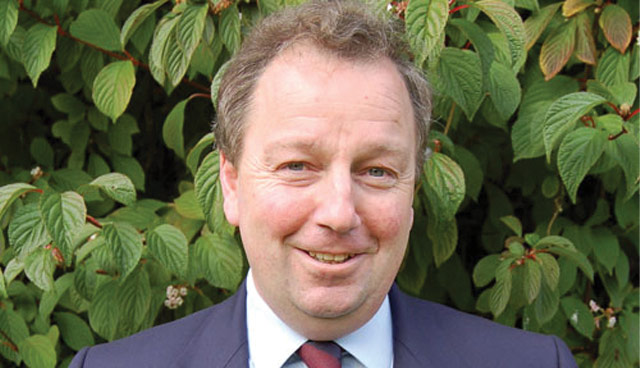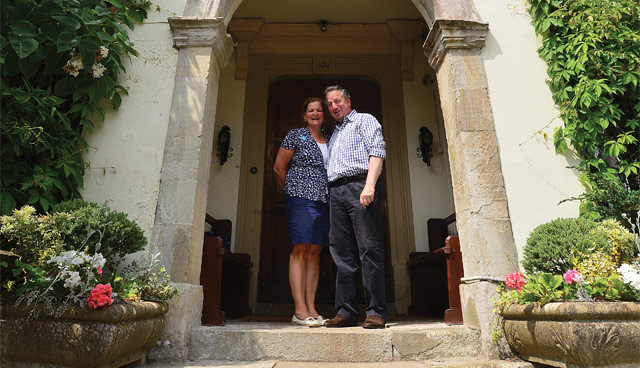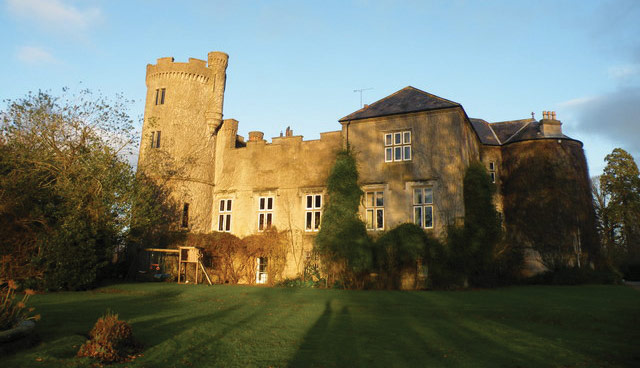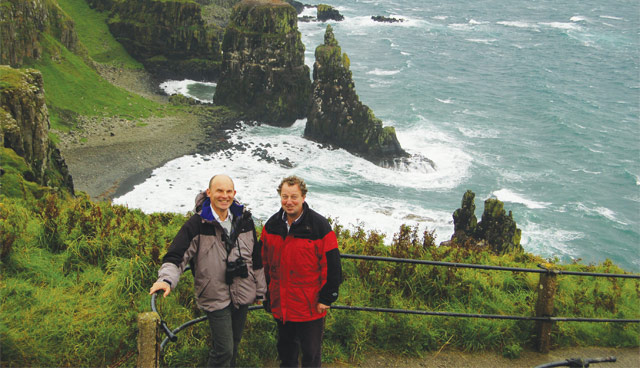Back to basics: Danny Kinahan

The UUP’s Danny Kinahan talks to David Whelan about his recent return to politics at local level having lost his MP seat in 2017, why he retains a presence in Westminster and his ambitions to see the party reverse their electoral decline.
Meeting on a plot of land close to the 400-year-old Castle Upton in Templepatrick, which until recently was the Kinahan’s historic family home, former UUP MP and MLA Danny Kinahan’s outlook on his temporary office could be viewed as somewhat symbolic of his political career.
A project to which he will fully apply himself and one on which he can build upon appears an interchangeable description. The land, which Kinahan retained following the sale of the vast Castle Upton grounds, grounds which he called home until the age of five, is to be the site of a new permanent home for the recently elected Antrim and Newtownabbey Borough councillor and his wife Anna.
It was from this site that Kinahan launched his campaign to re-enter politics having lost his South Antrim Westminster seat in the 2017 General Election to the DUP’s Paul Girvan, which he describes in frank language as a “kick in the teeth”.
Kinahan topped the poll in the Ballyclare DEA with 1,253 votes in May, marking a full-circle return to local politics, having served as a councillor in Antrim from 2005 to 2009. Later he would serve as an MLA for six years before being elected to Westminster in 2015.
With the UUP in severe electoral decline, Kinahan’s decision to contest the local elections came as a surprise to many, given his level of reputation and experience. For some, it potentially reflected the level of optimism for the return of Stormont amidst the political classes.
He, however, outlines a more simplistic arrival at the decision. Having lost his seat at Westminster, a spell on the political sidelines reinforced for him his “desire to help people”. A fresh opportunity to fulfil this role was one that he could not turn down.
“There are various angles from which you can help people,” Kinahan states. “Being on the ground and helping people is very gratifying and seeing the difference you can make to peoples’ everyday lives makes it all worth it. At the other end, there is the ability to stand up at Westminster and try to get across what Northern Ireland is like, what it needs and to try to get them onside to help this place.
“It’s a broad spectrum and Stormont has a valuable role in the middle. I’ve enjoyed these various roles in the past and I realised that it would be a shame to throw that away just because I’ve lost once.”
However, Kinahan makes no secret of the fact that he would like to get back to Stormont if and when it is operational and ultimately, his goal is to return to Westminster. Such is the regard in which he holds the influence that can be wielded in London for the benefit of Northern Ireland, Kinahan has continued his presence, even without a seat.
“When I was given my pass, a pass which I knew lasted for the whole of the next term of Parliament, and when we had no Ulster Unionists there and no SDLP, I thought to myself, I’m going to keep coming back here.
“I’m going to work to make them realise that there are other voices in Northern Ireland rather than those of the DUP and Sinn Féin. I had enough people in Westminster that I thought would still listen to me and that has driven me since 2017.”
Kinahan admits that another driving factor in his decision to continue a presence in Westminster was a belief that: “I’ve got to stay in this world and get back.”

Having lost his South Antrim seat, Kinahan joined forces with another outgoing MP, the SDLP’s former leader Alasdair McDonnell to create a lobbying company, also including ex-journalist and Stormont special advisor, Ray Hayden. As well as this, the ex-army captain privately lobbies on behalf of ex-servicemen and security personnel and continues to serve as a co-ordinator on an informal lobby group of MPs established by Henry Bellingham MP.
This, he argues, also allows him to continue to voice his desire to see victims supported and to ensure that Northern Ireland issues aren’t forgotten amidst these conversations.
Rise and fall
Ebbs and flows in Kinahan’s political career in the last decade have somewhat correlated with the fortunes of his party. His entrance in to politics in 2005 came as no surprise given that both his parents were politically active and vocal. In fact, Kinahan’s father, Robin Kinahan, was a former Lord Mayor of Belfast and briefly a Stormont MP for Belfast Clifton.
His path, however, was not a forgone conclusion given some other interesting characteristics of Kinahan’s background, including his direct relation to famous singer Chris de Burgh, a first cousin; and the fact that his uncle, Charles Kinahan was a founder member of the Alliance Party and Director of Bass Ireland. To boot, Kinahan enjoyed an early career as Christie’s Auction Houses’ man in Ireland, as a valuer of antiques.
In 2005, he joined the UUP, a party at a low ebb having been reduced to just one MP. His election to Westminster a decade later, alongside party colleague Tom Elliot, was portrayed as a turning point in the party’s fortunes. However, only two years into his tenure, Prime Minister Theresa May’s decision to hold a snap election saw the party lose its two MPs at Westminster. This, coupled with the loss of six MLA seats in the same year and the loss of 13 council seats and its sole MEP seat in 2019, has manifested itself into a huge challenge for the party.

Kinahan bemoans the decision to hold the snap election, stating his belief that he was making significant progress in building up a base of MPs who understood Northern Ireland and would work with Northern Ireland’s MPs for positive change. However, he does not believe his decision to enter local politics represents a reduction in ambitions for the party.
“I wasn’t in the firing line. I was a nobody again and I thought, right, I want to get back in there. What I have learned in my experience is that the public don’t care which level of politics you are, when they call you up they want you to be able to help. The difference is at our end, where you have an impact in different ways.”
Following a string of poor election results, the UUP are undergoing a review process, which Kinahan outlines will listen to people both within and outside of the party on their future direction. However, he is clear on the direction of travel that he would like to see: “My politics would be for that middle ground.”
Quizzed on whether the party’s most recent election strategies were wrong, he says: “It wasn’t wrong because the right thing for any unionist was to support Brexit because that’s what the public had voted for. Therefore, to put forward one of our most able politicians to be an MEP is totally logical. However, all the other parties had decided to fight the election on remain and Brexit, so we did the wrong thing from that point of view. We should have been looking at what the issues where that people were concerned about, not leading. Timing got us wrong.”
Kinahan suggests a similar summary on a poor local election return, adding that there were “smaller petty things” that caused the party to lose “a few seats that we should never have lost”, had the party been better organised. “We have got to get better organised and that is what we are seeking to do,” he states.
“We have really good policies but no one knows them. We’ve got to make sure that those policies are being talked about out on the doors,” he explains, adding criticism of the influence of ‘orange and green’ issues in Northern Ireland politics.”
One criticism levelled at the UUP’s electoral approach of late has been its inability to create clear space between its policies and that of the DUP. The labelling as ‘DUP lite’, however, is one that Kinahan believes is unavoidable given that the UUP seeks to include all of unionism.
“To be a true unionist, you have to include everybody. You have to be a broad church. That is everyone from one side of unionism to the other. If we are going to run this place well you need everybody onboard and you have to pull them together. To that end, you are always going to be tackling the DUP with an element of DUP lite. I think as a party we should be much stronger in leaning towards things on the more progressive side.”
Often viewed as a progressive, Kinahan was the only UUP MLA to support legalising same sex marriage, making a speech on the issue at Stormont, which many deemed risky just weeks out from the Westminster election, which he eventually won. His image is that of a politician who understands that the world around us is changing and in order to thrive and survive, the party must make efforts to occupy the space where new, younger voters want to be.
To that end, Kinahan describes himself as “very pleased” at the recent moves in Westminster to apply pressure on Stormont to resolve issues like legalising same sex marriage and abortion. He outlines his preference that such decisions were taken at Stormont but adds than in its absence it is “absolutely right” that “limbo” is not allowed to continue, adding his preferred outlook would be for direct rule on all issues until Stormont is returned.

When I lost my seat I went straight to Dublin to build bridges with as many Irish politicians as I could, realising that someone has go to offer the unionist point of view.
On the prospect of that return, however, he is less than hopeful. Kinahan believes he has applied pressure to both Westminster and Dublin to help restore a reformed Stormont. One that will avoid future collapse.
“When I lost my seat I went straight to Dublin to build bridges with as many Irish politicians as I could, realising that someone has go to offer the unionist point of view. I was clear in talking to Simon Coveney, whose focus was on getting Stormont up and running, that such a move would be fruitless unless changed to a proper working solution.”
Kinahan believes that not enough unionists are making a similar journey south. “Unionism has got to open up,” he says. “We are trapped by the strands of the Belfast Agreement but shouldn’t allow ourselves to be. I think unionism should be talking informally all of the time, understanding each other, not just with Ireland but in Scotland, Wales and particularly, with Westminster. Many in Westminster see Northern Ireland as a thorn in the side and we have to work to build on those that believe in us and believe in the union to show that we are all part of it.”
A self-described “remainer” Kinahan sees Brexit as an existential threat to the union. Much like the comments issued by former First Minister Peter Robinson recently, where he suggested unionism would be foolish not to prepare for the possibility of a united Ireland, Kinahan states that every politician should always have an eye to the future.
“I had a student ask me recently if I thought there would be a united Ireland in 100 years. I gave it a lot of thought and what I came up with was 100 years ago, Ireland was united under the crown and now we have the current situation. In 100 years the union we are all thinking about will be completely different.”
However, the biggest threat to the union, he believes is the DUP, adding: “Brexit and the 10 DUP seats have brought about an unhealthy focus on Northern Ireland. Unionists being clumped together as aligned with the DUP is against everything I had been doing in the two years at Westminster.
Returning to his role at local level, Kinahan describes a much changed setting than that when he was first a councillor. The shift to council business now being done in the evenings rather than during the day, he believes, is facilitating him to be agile in his working location between Ballyclare and Templepatrick.
Another change, he highlights, is the focus of the work. Kinahan’s early work has centred on dealing with constituent requests around traffic and roads issues in Ballyclare. The other major issue is that of Personal Independence Payments (PIP), an issue he admits he has had to school up on, now that he does not have the support staff offered by an MLA or MP position.
He believes that the role of councillors is being made more difficult because of the absence of Stormont and subsequent key decisions but takes an optimistic outlook: “I am in a better position in that I can have effect at local level but I can also go to Westminster and rattle the cage there, where decisions evidently, can be taken.”
Quizzed on whether now that he has returned to local politics he might like to follow in the footsteps of his father, Kinahan suggests that while to be asked would be a huge honour, for now his focus is on effecting change. He takes pride in his new title as alderman, one also held by his father, but ultimately, his goal is to return to Westminster, ideally alongside a group of other Ulster Unionists to raise the profile of Northern Ireland.





